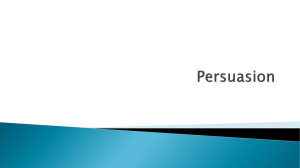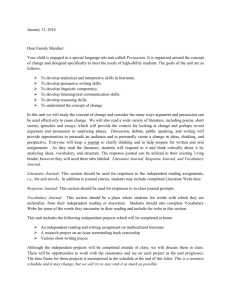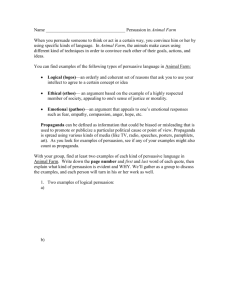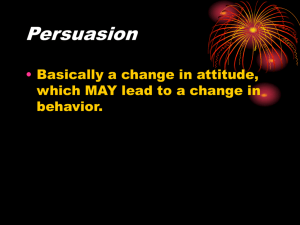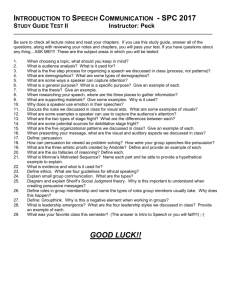Impact of Persuasion PPT
advertisement
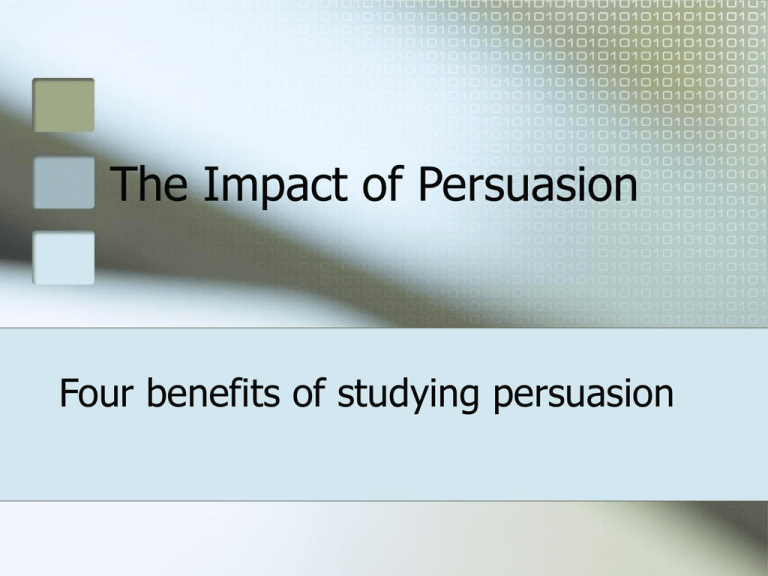
The Impact of Persuasion Four benefits of studying persuasion The pervasiveness of persuasion More than $260 billion per year is spent on advertising in the U.S. (Kardes, 2005) The average person is exposed to 300-400 persuasive messages per day from the media alone (Rosseli, Skelly, & Mackie, 1995) The average person watches 1,000 commercials per week (Berger, 2004) An average of $800 per person is spent on advertising in the U.S. each year (Berger, 2004) Obvious forms of persuasion Product placement on American Idol A 30 second spot for Super7Bowl XLII costs $2.5 million for a 30 second spot. Product placements in movies and TV amounted to $2.5 billion in 2005 (PQ Media). Morgan (2005) “between 15-30 products are inserted in every half hour of television programming” (p. 62). Product Placement Rules http://www.brandchannel.com/br andcameo_films.asp Featured Brands: Apple, Bell, Cadillac, Chock Full O’Nuts, Chrysler, Cisco, Ford, Ford Mustang, Hill-Rom, HP, Lacoste, Listerine, Los Angeles Dodgers, Mercedes, Motorola, Pepsi, Philips, Pontiac, Pyrotect, Rolls Royce, San Francisco Giants, Sharp, The North Face, The Riviera Hotel and Casino, Timberland, Toyota, United States Parachute Association Featured brands: Apple, Belstaff, BMW, Citibank, Datascope, Ford, Ford Mustang, Hamilton, Honda, Hummer, JVC, Kleenex, Loews, Magnavox, McDonald's, MetLife, Mobil, Nautilus, NBC, Nissan, Panasonic, Ronzoni, Salvatore Ferragamo, Sbarro, Spam, Staples, Tic Tac, Time, Verizon, Viking, XM Satellite Radio Less obvious forms of influence “buzz” marketing or “stealth” marketing: Based on word of mouth endorsements two-thirds of all consumer goods sales are now directly influenced by word-ofmouth (Middleton, 2001) Endorsements are disguised as personal, spontaneous encounters with a product’s users Relies on “product seeders” or trendsetters •Ford gave trendsetters free cars and asked them to be seen in trendy places with them Viral marketing in action YouTube’s staggering popularity was not driven by commercial advertising Marketers are scrambling to get onto MySpace.com and Facebook.com Live Strong bracelets became an overnight fashion sensation Burger King on MySpace.com Not so obvious contexts for persuasion science art architecture and environmental design traffic engineering Picasso’s Guernica (art as persuasion) Weird persuasion The town of Clarke, Texas renamed itself Dish, Texas in exchange for 10 years of free satellite TV GoldenPalace.com paid $25,000 for William Shatner’s kidney stone and $28,000 for a grilled cheese sandwich with an image of the Virgin Mary. Pervasiveness of persuasion Anti-war persuasion: Getting naked for peace Billboards Celebrity endorsers Infomercials Logos, insignia TV commercials Merchandising Print ads Product placement Spam, pop-up ads Sponsorship Telemarketing Social media 1. the instrumental function Learning about persuasion assists one in becoming a more effective persuader The ability to persuade is one important dimension of communication competence Communication competence involves acting in ways that are perceived as effective and appropriate (Spitzberg & Cupach, 1984) the fact that you’ve been engaging in persuasion your whole life doesn’t mean you’ve been doing it as well as you can. 2. the knowledge function Enquiring minds want to know Learning about persuasion increases one’s understanding of how persuasion works, or “what makes it tick.” Overcoming habitual persuasion: Individuals are often unaware of their own habitual, reflexive patterns of persuasion. underlying social forces and rhetorical exigencies that give rise to persuasion 3. the defensive function Learning about persuasion makes one a more savvy, discerning consumer of persuasive messages One is less likely to succumb to telemarketers, infomercials, mail-order scams, and high pressure sales tactics. study of persuasion can expose strategies, tactics, unethical approaches 4. the debunking function Learning about persuasion helps to dispel folk-wisdom, false stereotypes, and outmoded concepts of how persuasion functions Example: gaze avoidance and deception Persuasion research has yielded a host of non-obvious, counter-intuitive findings Example: logical-emotional dichotomy
